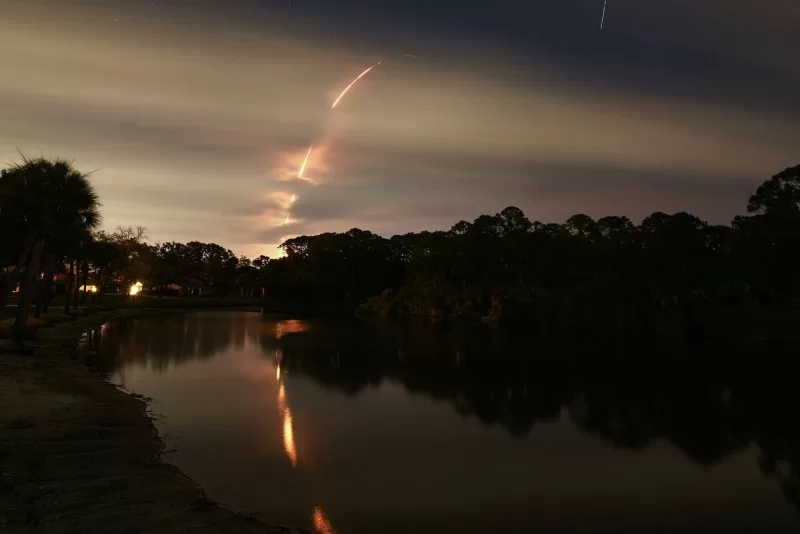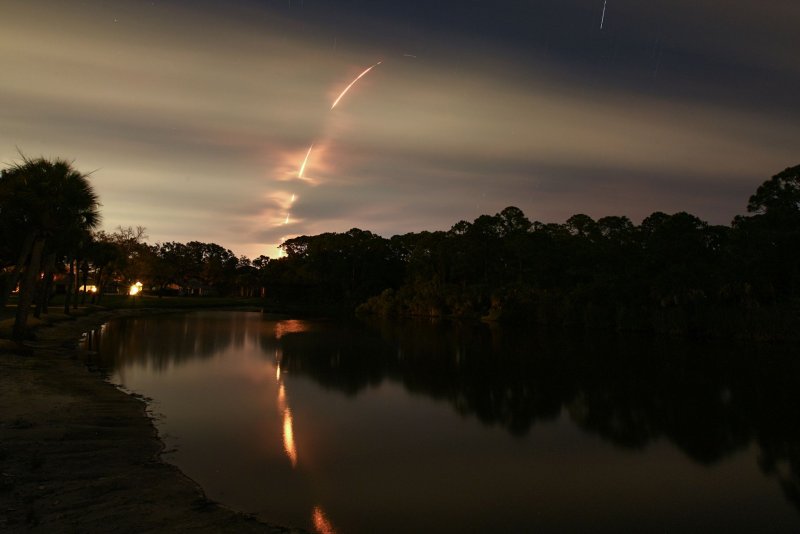SpaceX’s Falcon 9 rocket has completed 350 missions since its debut in 2010. File Photo by Joe Marino/UPI |
License PhotoJuly 13 (UPI) — SpaceX‘s prolific Falcon 9 rocket was grounded after a rare malfunction resulted in a failed satellite mission in California.
The reusable Falcon 9 booster, which has powered numerous Starlink missions as well as crewed flights for NASA and the International Space Station, experienced an issue during the launch Thursday night of 20 Starlink satellites from Vandenberg Space Force Base in California, according to a thread on X.
During flight, the Falcon 9’s second-stage booster did not complete its second burn as intended, causing the batch of satellites to be deployed into a lower than desirable orbit, SpaceX said.
The Federal Aviation Administration announced Friday the missions are halted, including in Florida, as the agency and SpaceX investigate.
SpaceX said it found the upper stage of the booster suffered a “liquid oxygen leak.” Liquid oxygen is used as an oxidizer for the rocket’s fuel.
With the Starlink satellites unable to reach target orbit, they are at the mercy of Earth’s gravity.
SpaceX said Friday it made contact with 10 of the 20 satellites and was trying to bring them up to target orbit using their ion thrusters.
Company founder and CEO Elon Musk posted on X, which he also owns, “we’re updating satellite software to run the ion thrusters at their equivalent of warp 9. Unlike a Star Trek episode, this will probably not work, but it’s worth a shot.”
The remaining satellites will likely burn up in the Earth’s atmosphere. SpaceX said the satellites are designed to disintegrate on reentry, so they don’t pose a risk to people or property on the ground.
Thursday’s incident is a setback for Falcon 9, which otherwise has had a stellar record.
Since its debut in June 2010, Falcon 9 has launched more than 350 missions, including 13 crewed flights.
Falcon 9 experienced one catastrophic failure in its lifetime. An explosion in June 2015 cost SpaceX a robotic Dragon cargo capsule that was bound for the ISS. The rocket was grounded for six months pending an investigation
The rocket again exploded just before the launch of a satellite mission in September 2016, causing it to be grounded for nearly five months.
Thursday’s failure, while not catastrophic, puts SpaceX up against the clock as Falcon 9 is scheduled to run two more crewed missions within the next couple of months.
The rocket is scheduled on July 31 to fly tech billionaire Jared Isaacman and three other crew members into orbit in a private mission dubbed Polaris Dawn from Kennedy Space Center.
SpaceX likely won’t reach that target date, but Isaacman said he doesn’t expect to wait long.
“SpaceX has an incredible track record with Falcon 9. I can say from personal experience they are very transparent when issues arise,” he said on X. “I have no doubt they will arrive at a cause quickly and ensure the most cost-effective and reliable launch vehicle keeps delivering payload to orbit. As for Polaris Dawn, we will fly whenever SpaceX is ready and with complete confidence in the rocket, spaceship and operations.”
Also in Florida, Falcon 9 was slated to launch a vital resupply mission to the ISS next month to support the Starliner crew and other astronauts on board.
“Crew safety and mission assurance are top priorities for NASA,” the agency said in a statement. “SpaceX has been forthcoming with information and is including NASA in the company’s ongoing anomaly investigation to understand the issue and path forward.”
And a Starlink 10-4 mission was set to lift off before dawn Sunday from Cape Canaveral Space Force Station and another early morning one had been scheduled for Wednesday.

